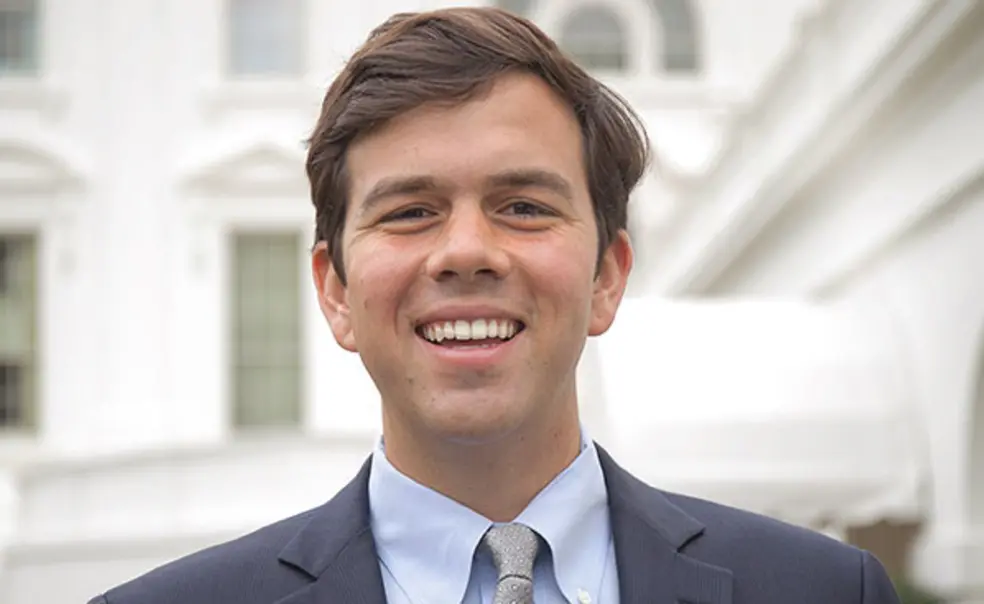Josh Miller ’12 Completes Work in White House Digital Role
When Josh Miller ’12 decided to take an indefinite leave of absence from Princeton just as his senior year was kicking off, it didn’t seem like a bright idea. He had an idea for a startup, but he was a sociology major with little experience in tech, he had no funding, and he barely knew his cofounders.
Five years and three jobs later, Miller just finished up a gig in Washington, D.C., as the White House’s first-ever director of product, where he was tasked with figuring out how to leverage technology to help everyday people get involved in policy issues close to President Barack Obama’s heart.
Miller teamed up with Kickstarter to raise money for Syrian refugees. He partnered with Uber to let customers donate rides to recently homeless veterans. He even figured out how to rejigger manufacturing and distribution supply chains to dramatically cut the cost of diapers for poor families.
“Anyone who’s ever known me will tell you I was never going to succeed in a strictly academic setting,” says Miller, who found fulfillment at Princeton less in grades than in extracurriculars like organizing a set of sold-out concerts that raised money for charity. “But I’ve always had this ability to create projects out of nothing and get people excited about them.”
The Office of Digital Strategy, where Miller worked, pushed the former president’s use of tech beyond simply using social media to communicate with citizens. Instead, he says, the goal was to find new ways to use the Internet to “mobilize the passions of the American people” in order to affect change on civic issues.
“We raised a million dollars on Kickstarter in just a few hours,” Miller says. “It made me realize the convening power of the White House.”
Miller left Princeton to create Branch, a software platform for online conversations. Three years later, the company was acquired by Facebook, which took on Miller as a product manager to tinker on experimental projects. He joined the White House in 2014 at the request of another Princeton alumnus, former Twitter executive Jason Goldman ’99, who knew Miller from his startup days and who was heading up the digital strategy office.
Miller has been interested in helping people create and leverage networks ever since a light bulb went off in Professor Stanley Katz’s Woodrow Wilson School course on civil society and public policy. It was there he heard a guest lecturer, Bowling Alone author Robert Putnam, talk about “social capital.”
Miller attended a large, diverse public high school in Los Angeles. Curious about why so few minority students ended up in AP classes, Miller produced a documentary on the racial aspects of student tracking in his public school system. (The film later earned him a Princeton Prize in Race Relations.) Miller arrived at the University not knowing what a “Choate” or an “Andover” was, but he quickly started puzzling over how institutions and relationships opened doors for some but not others.
Putnam’s ideas about social capital “explained more about the world than anything else I’d learned to date,” Miller says. He was inspired by Putnam’s call to find ways to make “weak” ties into “strong” ones. “To this day, I think about that more than anything else,” he says.
At the White House, Miller’s proudest moment was figuring out that if you modified the packaging on diapers and allowed nonprofit organizations to order them in bulk, costs would plummet for poor families. One in three poor families have to reuse diapers because they can’t afford the prices at neighborhood stores, and they don’t have access to online or big box retailers, which often offer discounts.
“People in technology talk about working on big-scale problems,” Miller says. But because there are so many white men in the industry, he explained, many possibilities never cross their radar. “The White House experience taught me about problems that are not mine.”
As a political appointee, Miller’s tenure ended with the president’s. With a network of his own now full of high-powered players, not just in Washington but also among the tech glitterati (BuzzFeed’s Jonah Peretti and Twitter founders Evan Williams and Biz Stone were early Branch supporters), Miller could write his own ticket. After six years of cranking in tech and politics, however, he first wants to take some time off. He’s even thought about eventually returning to Princeton to finish his degree. “After being out in the world of work, having six months to write a thesis sounds awesome,” he says.










No responses yet